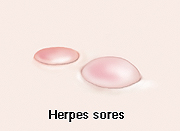For Teens: Understanding Herpes
For Teens: Understanding Herpes
Herpes is a sexually transmitted disease (STD) that causes painful outbreaks of blisters and sores. It spreads through contact with an infected area—usually a sore on the genitals, rectum, or mouth. Herpes can also spread even when you can’t see any sores. There’s no cure for herpes. But treatment can help make outbreaks happen less often and be less severe.
What to look for
An outbreak can happen a few days or weeks after sex. Some people have only 1 outbreak in their lifetime. Others have several outbreaks a year.
An outbreak begins with blisters on the penis, or in or around the vagina, mouth, or rectum.
After a few days, the blisters break and leave painful sores. These may take days or weeks to heal.
The first outbreak is often the worst. Later outbreaks are also painful, but tend to heal faster.
Treatment
Medicines can help reduce how often outbreaks happen. They can also lessen pain. You can help sores heal faster by keeping them clean and dry. To avoid spreading the virus, don’t have sex during an outbreak. Also, avoid oral sex if you have a cold sore. Cold sores are another form of the herpes virus (oral herpes). Oral herpes can be passed from the mouth to the genitals.
There is no cure for herpes. Medicines can help you manage herpes. But they can't rid your body of the virus. The herpes virus will stay inactive (dormant) inside your body. It can become active again due to certain triggers such as stress.
If you don’t get treated
Herpes isn’t deadly. But it does have risks:
Having herpes increases the chance of catching HIV (the virus that causes AIDS). Herpes sores make it easier for the HIV virus to be passed during sex.
If a woman has an outbreak during pregnancy, herpes can be passed to the baby at birth. This can cause very serious problems or even be fatal for the baby.
Don’t kiss or have sex if you or your partner has a herpes sore. And use latex condoms every time you have sex—even between outbreaks. Using latex condoms correctly and consistently can help reduce the spread of sexually transmitted diseases.
Updated:
November 06, 2017
Reviewed By:
Adler, Liora C., MD,Fetterman, Anne, RN, BSN,Image reviewed by StayWell medical illustration team.
